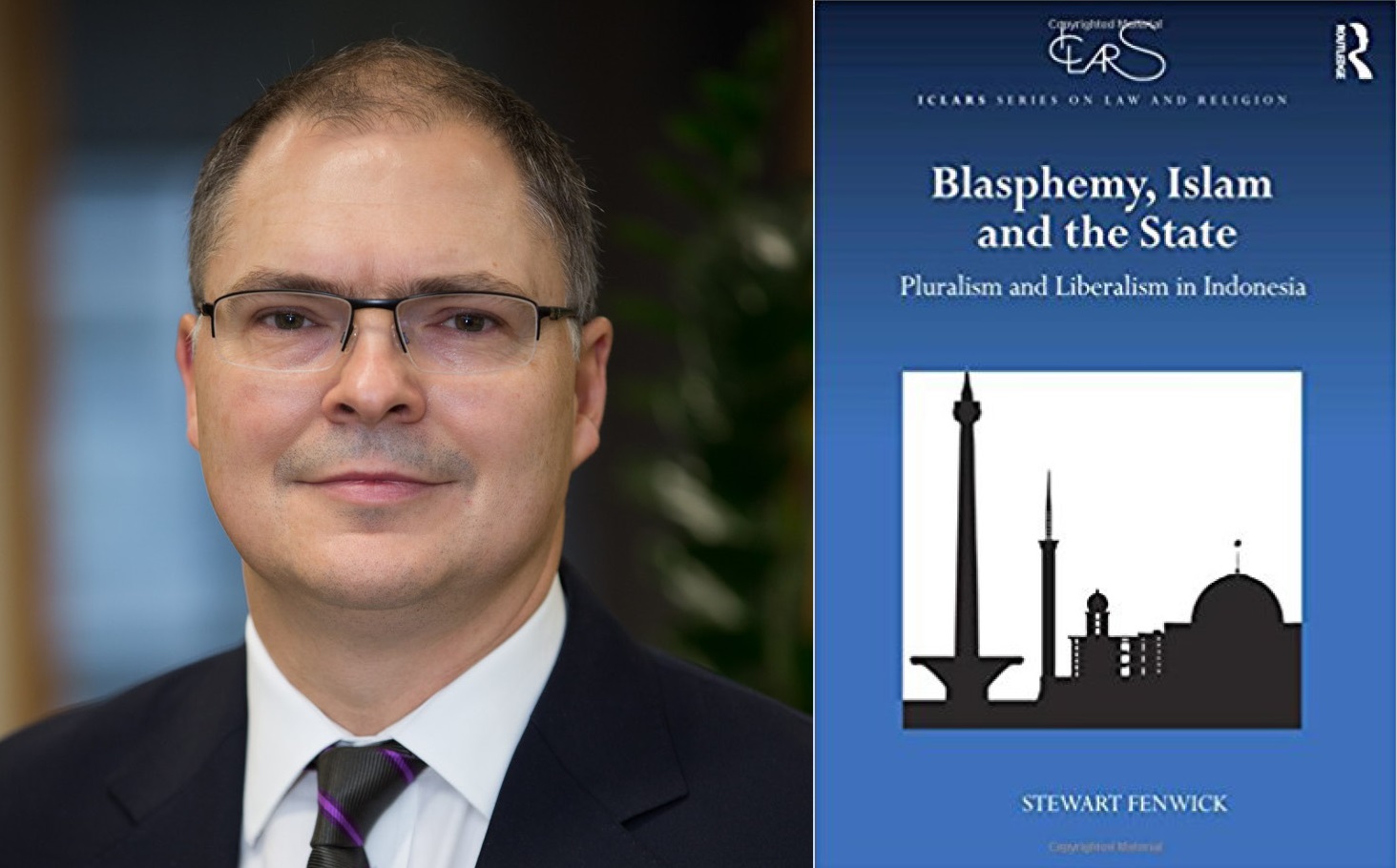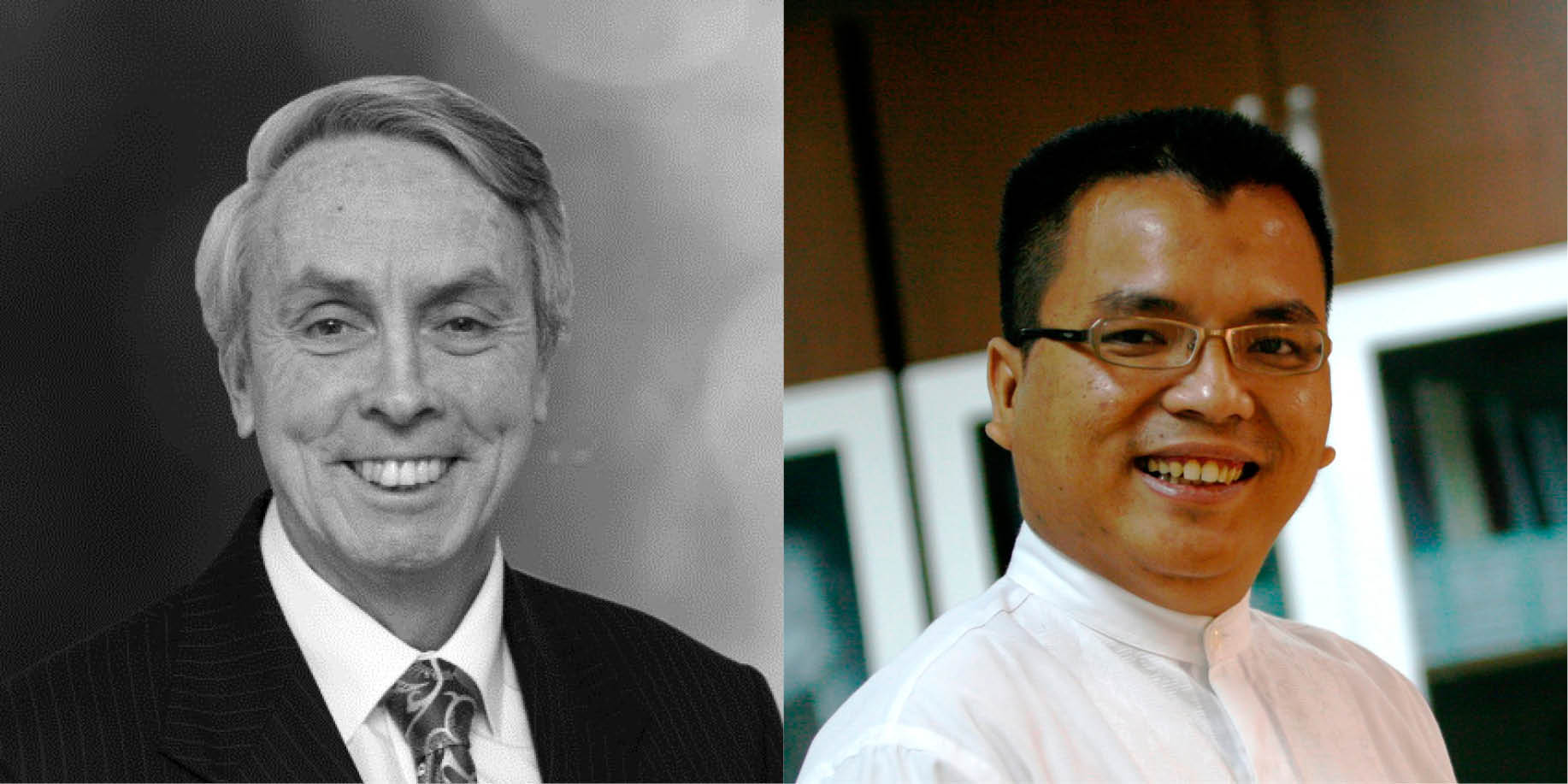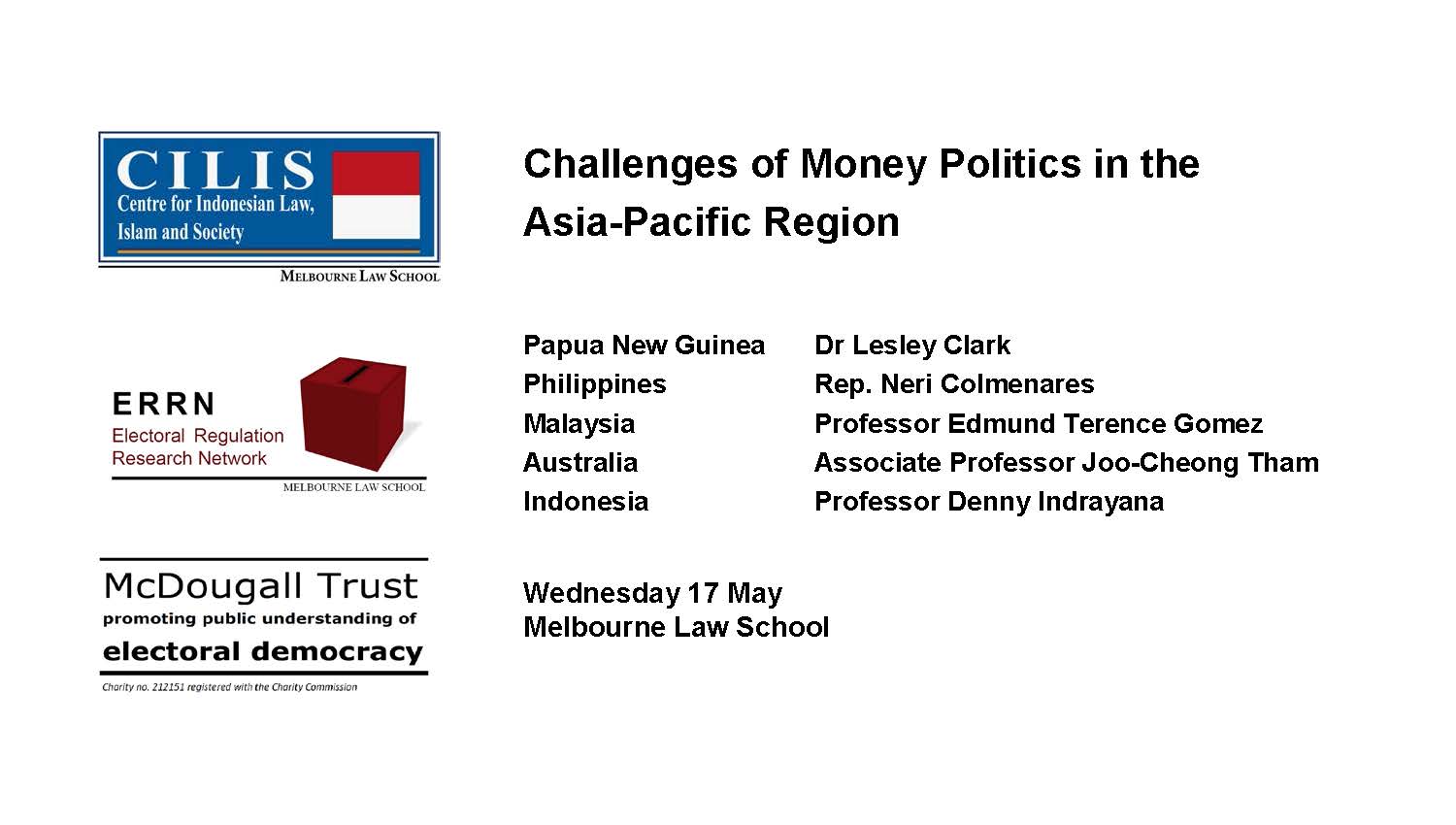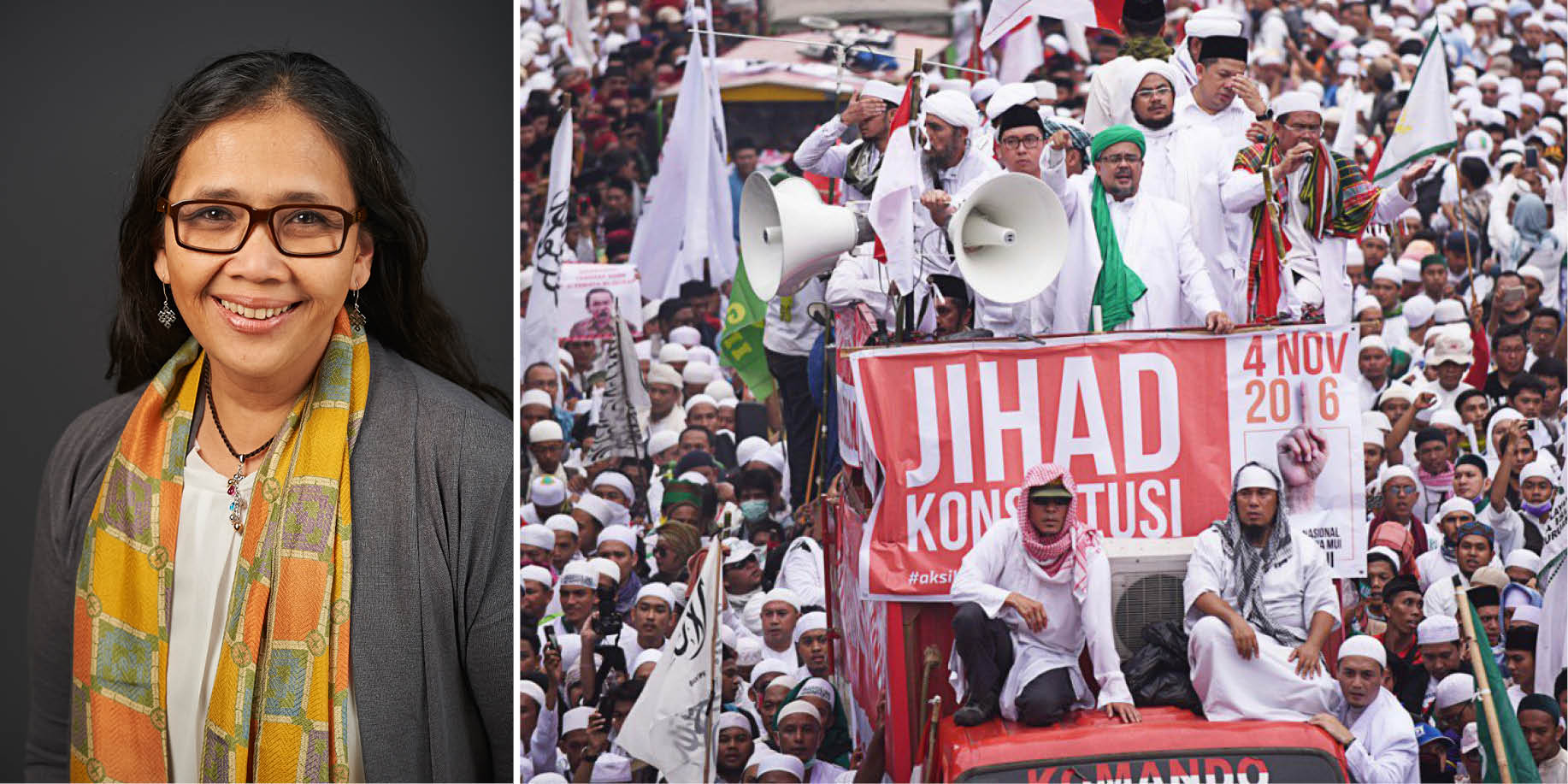2017 Past Events
Blasphemy, Islam and the State
- "Seminar and Book Launch: Blasphemy, Islam and the State: Pluralism and Liberalism in Indonesia"
Hosted by the Centre for Indonesian Law, Islam & Society
30 May 2017Guest speaker Simon Butt, Professor of Indonesian Law, Sydney University, and author Dr Stewart Fenwick explored the legal, political and constitutional problems of religious freedom in Indonesia today.‘Blasphemy, Islam and the State: Pluralism and Liberalism in Indonesia’ by Dr Stewart Fenwick
The controversy generated by the trial of Jakarta Governor Basuki Tjahaja Purnama, or ‘Ahok’, on blasphemy charges and the political drama surrounding his failed bid for reelection demonstrates the importance of the Indonesian blasphemy regime for contemporary Indonesian democracy. This book, which focuses on another equally controversial prosecution, considers the legal and constitutional issues arising in cases of religious freedom. However it goes much further by dealing with the critical issue of the nature of the foundational principles underpinning the modern Indonesian state, and its partial embrace of liberal political principles.
About the Book
This book draws on the work of John Rawls to explore the interaction between faith, law and the right to religious freedom in post-Soeharto Indonesia, the world’s largest democracy after India and the United States. It argues that enforcement of Islamic principles by the state is inconsistent with religious diversity and the country’s liberal constitution. The book thus contributes to understanding the role of religion in the development of democracy in the world’s largest Muslim nation. A key objective is to test the argument that Rawls’ thinking about public reason cannot apply to the case of Indonesia, and Muslim states more broadly. The book therefore contributes to emerging scholarship that considers Rawls in a Muslim context. In addition to examining public reason in detail and considering critiques of the concept, the work highlights the fact that the theory was created to deal with value pluralism and is therefore relevant in any religious setting, including an Islamic one. In doing so, it emphasises that Islam is multifaceted and demonstrates the difficulties, and negative consequences, of integrating faith and law in a liberal state.
Professor Simon Butt is a current ARC Australian Postdoctoral Research Fellow and Associate Director (Indonesia) for the Centre for Asian and Pacific Law at The University of Sydney, where he teaches Indonesian law. Prior to joining the faculty as Senior Lecturer, Simon worked as a consultant on the Indonesian legal system to the Australian government, the private sector and international organisations, including the United Nations Development Programme (UNDP) and the International Commission of Jurists (ICJ). He has taught in over 70 law courses in Indonesia on a diverse range of topics, including intellectual property, Indonesian criminal law, Indonesian terrorism law and legislative drafting. He is fluent in Indonesian.
In 2008, Simon's thesis titled ‘Judicial Review in Indonesia: Between Civil Law and Accountability? A Study of Constitutional Court Decisions 2003-2005’ was awarded the University of Melbourne Chancellor's Prize for Excellence in the PhD Thesis. Simon has written widely on aspects of Indonesian law, including two recent books: ‘Corruption and Law in Indonesia’ (Routledge 2012) and ‘The Constitution of Indonesia: A Contextual Analysis’ (Hart, 2012, with Tim Lindsey).
Dr Stewart Fenwick is an Honorary Professor of the Australian Catholic University at the Institute for Religion, Politics and Society, and a Senior Associate of the Centre for Indonesian Law, Islam and Society, and the Asian Law Centre, Melbourne Law School. He was awarded the Harold Luntz Graduate Research Thesis Prize for 2015 at the Melbourne Law School, and the Chancellor's Prize for Excellence in the PhD Thesis for 2016 at the University of Melbourne. Stewart has extensive experience in the design and delivery of law and justice programs in Asia, led undergraduate programs in Law and Society in Southeast Asia and Law and Civil Society in Asia, and has published on law and development and Indonesian law. He currently works in a senior role in judicial administration.

Australian & Indonesian Voting Systems
- "Understanding Australian & Indonesian Voting Systems: Lessons for the Future”
Co-hosted by the Electoral Regulation Research Network and Centre for Indonesian Law, Islam & Society
17 May 2017"Understanding Australian & Indonesian Voting Systems: Lessons for the Future”
Indonesia and Australia are two very different democracies. One is new, the other much older. One is based on European models of governance, the other on British traditions. Both, however, are huge countries with widely dispersed populations. This seminar explores how the voting systems of these two countries work. What are their differences and similarities? What are their strengths and weaknesses? And how can the challenges of democratization in both countries be better met by learning from each other? How might each system be reformed? Two leading experts on electoral systems addressed these questions by explaining the Australian and Indonesian voting systems, conducting a dialogue on the future of electoral democracy in their countries.
Warwick Gately’s early career was with the Royal Australian Navy. Joining the Western Australian Electoral Commission in 2003, he conducted three State general elections as well as local council elections and referendums on retail trading hours and daylight saving. He oversaw the redrawing of the State’s electoral boundaries under “one vote, one value” legislation. In April 2013, he was appointed as the Electoral Commissioner for Victoria with responsibility for the administration of the State’s register of electors and the conduct of Parliamentary and local council elections as well as referendums and various statutory polls in Victoria. He holds a Bachelor’s Degree in Political Science and Government, a Master’s Degree in Defence studies and is a graduate of the Institute of Company Directors.
Professor Denny Indrayana is an internationally recognised anticorruption campaigner who has played a leading role in law reform efforts in Indonesia. He served as Deputy Minister of Law and Human Rights from 2011-2014 under President Susilo Bambang Yudhoyono. Before that, Denny was Special Advisor for Legal Affairs, Human Rights and Anticorruption to President Yudhoyono, Chair of the Centre for the Study of Anticorruption at Gadjah Mada University, and Director of the Indonesian Court Monitoring NGO. He is a Professor of Constitutional Law at Gadjah Mada University and a Visiting Professor in the University of Melbourne Law School.

Money Politics in the Asia-Pacific Region
- "One-Day Workshop: The Challenges of Money Politics in the Asia-Pacific Region”
Co-hosted by Electoral Regulation Research Network and Centre for Indonesian Law, Islam & Society
17 May 2017This workshop examined money politics and the following issues:- Is political corruption in the Asia-Pacific region somehow special?
- Is money politics always a product of local conditions or are there universal similarities?
- What drives money politics and how can it be stopped?
Leading experts spoke on money politics from six countries:
Melanesia with a focus on Papua New Guinea: Dr Lesley Clark, James Cook University
Philippines: Congressman Neri Colmenares
Malaysia: Professor Edmund Terence Gomez, University of Malaya
Indonesia: Professor Denny Indrayana, Visiting Professor, Melbourne Law School
Australia: Associate Professor Joo-Cheong Tham, Director, Electoral Regulation Research Network
Bespoke Lawyering
- “Bespoke Lawyering: The Transnational Corporate Lawyers of Jakarta, Dubai and Singapore”
Hosted by the Centre for Indonesian Law, Islam and Society
12 April 2017
Bespoke Lawyering: The Transnational Corporate Lawyers of Jakarta, Dubai and SingaporeLegal connections across Asia are undergoing a radical reconfiguration. Transnational corporate lawyers, and the global law firms for which they work, are undertaking new modes of documenting and disputing legal relationships. As a consequence, commercial relationships across the region have undergone dramatic change over the last three decades and the map of Inter-Asian legalities is being quietly redrawn. Within this new legal ecology transnational corporate lawyers act as intermediaries. They facilitate commercial relationships between businesses and other actors, such as governments, across Asia and beyond.
Three global cities – Jakarta, Dubai and Singapore – are important nodes of commercial and legal connection. The bespoke lawyers that work in them act as administrators of globalisation as they mediate between intricate business and government relationships across Asia. Their activities provide the glue for commercial networks that connect Asia to the rest of the world. In this seminar, Dr Kingsley theorised these interconnections across Asia to interrogate the ways that Asian cultures, histories and politics are changing definitions of ‘law’ and reshaping what it means to be a contemporary ‘lawyer’.
Dr Jeremy Kingsley is a legal scholar and anthropologist and a Senior Lecturer at Swinburne Law School, Melbourne, Australia. Dr Kingsley received his LLM and PhD degrees in Law at the University of Melbourne and his BA and LLB from Deakin University. He has been a Postdoctoral Research Fellow at the Asia Research Institute and then a Senior Research Fellow at the Middle East Institute, both at the National University of Singapore (NUS). While at NUS, he lectured at Tembusu Residential College and within the Comparative Asian Studies PhD Program.
Dr Kingsley's research has focused upon religious and political authority in Indonesia and how this affects local governance. He is currently undertaking a research project titled: “Inter-Asian Legalities”, which examines transnational corporate lawyers in Jakarta, Dubai and Singapore. He has undertaken extensive field research on the eastern Indonesian island of Lombok, as well as in Jakarta, Morocco and Dubai. His work has been published in academic and public affairs journals.

Intolerance, Elections and Primordialism
- “Intolerance, Elections and Primordialism in Indonesia: Beyond the Ahok Case”
Dr Sandra Hamid
Hosted by the Centre for Indonesian Law, Islam and Society
5 April 2017Indonesia was built on the premise of pluralism, as enshrined in the state ideology, Pancasila, but tension over the relationship between religion and the state has always been present. Recently, ‘othering’ along primordial lines has become a prominent part of political discourse. During the 2017 Jakarta elections, the country saw divisive public debates and mobilisation, anchored in the intersection of politics and faith, driven by intolerance and primordialism. Having ignored the issue for decades, most Indonesians were caught off guard. Why did this happen, and what does it mean for Indonesian democracy? In this seminar, Dr Hamid asked what has allowed religious intolerance to take centre stage in Indonesia’s electoral democracy.
Dr Sandra Hamid is The Asia Foundation's Country Representative to Indonesia (2012-present). Formerly she served as the Senior Director for Programs (2008-2011), Programs Director for Aceh (2004-2008) and Elections Program Manager (2003-2004). A cultural anthropologist and development specialist with strong interests in political participation and civil society, Sandra has 20 years’ experience as a journalist, researcher, and international development professional in Indonesia, East Timor and the USA.
A two-time recipient of The Asia Foundation's Presidential Award for Exceptional Performance and a Draper Hills Summer Fellow on Democracy and Development at Stanford University, Dr. Hamid is also a former Fulbright Scholar. She completed her PhD in anthropology at the University of Illinois at Urbana-Champaign.
Image: Antara/Akbar Nugroho Gumay
